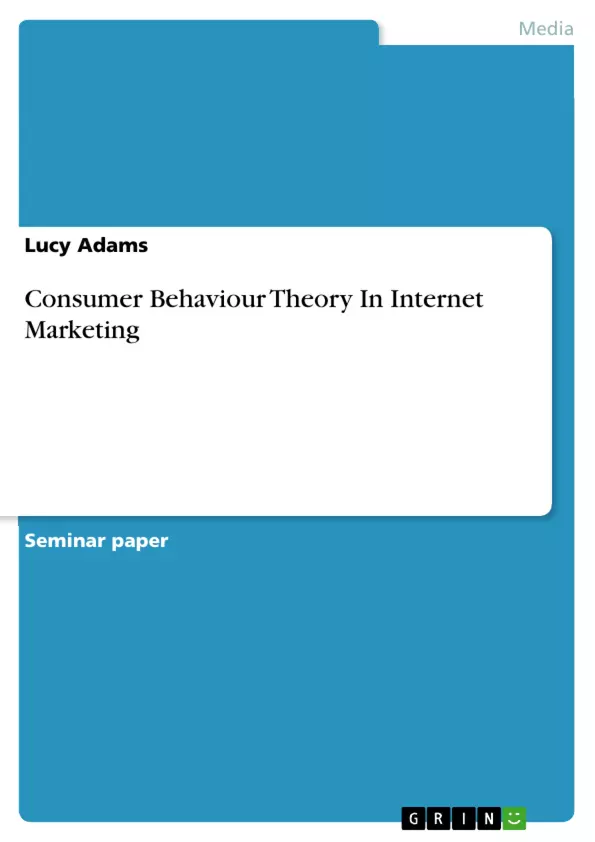This study focuses on consumer behaviour in relation to internet marketing. There is a relationship between consumer participating on online marketing and their behavioural perspective. For instance, the behavioural perspective of consumers towards e-shopping varies depending on several factors. First, it is based on the media system dependent theory which explains dependency relationships between individuals and the medium of communication. It is also based on the perceived usefulness of e-shopping in meeting and understanding ones society or self, orientation meaning actions or interactions of consumers and finally it depends on play that deals with e-shopping and interactive goals. For example, using an email survey that focused on166 respondents that were randomly picked from the staff, faculty, and student population in a mid-western university in US studied, the influence of consumer behaviour on online business, chatting with friends, and news reading was empirically tested. Averagely consumers surveyed had purchased eight various products online in the last seven months, spent twenty minutes in daily reading news online, and ten minutes were spent on net chatting with clients. The consumers also portray positive attributes towards e-shopping and overall e-commerce. This report thus seeks to analytical research on how consumer behaviour can be used on internet marketing.
Table of Contents
- An abstract
- Introduction
- The Aim/S of the Study
- Theoretical Approaches in achieving goals met through media
- Goal Dimensions of Media dependent Relationship
- Internet Media System Dependency Theory
- Internet Activities
- Consumer behaviour and Online Shopping
Objectives and Key Themes
This study investigates consumer behavior within the context of internet marketing. It examines the relationship between consumers' online activities and their behavioral patterns. The study aims to identify and explore the factors influencing consumer decisions regarding online shopping, news consumption, and social interaction. It also aims to provide recommendations for businesses seeking to improve their productivity through effective internet marketing strategies.
- Media System Dependency Theory (MSD) and its application to online behavior
- The role of personal and social goals in driving online activities
- The influence of online shopping on consumer behavior
- Factors affecting online activities, including demographic, technological, and social influences
- Strategies for businesses to leverage consumer behavior for successful internet marketing campaigns
Chapter Summaries
The study begins with an introduction outlining the instrumental nature of online activities, highlighting their purposive and goal-driven nature. It then examines the aims and objectives of the research, focusing on consumer behavior in relation to e-shopping and identifying opportunities for businesses to enhance their online presence.
Next, the study delves into theoretical approaches to understanding goal achievement through internet media. It introduces the concepts of Users and Gratifications and the Media System Dependency Theory (MSD), emphasizing the importance of consumer control over online content and the relationship between individuals and online media.
Further, the study explores the concept of Internet Dependency Relations (IDR) and its impact on online activities such as shopping, news reading, and chatting. It analyzes the relationship between the intensity of online activities and MSD goal dimensions such as orientation, understanding, and play.
The study then delves into the Internet Media System Dependency Theory (IMSD), outlining its key principles and concepts. It examines how consumers' dependence on media resources affects their goal attainment, emphasizing the diverse goals individuals seek through online media.
The chapter on internet activities provides insights into the common online behaviors of Americans, highlighting the prevalence of activities such as email communication, news reading, and online shopping. The study examines the factors influencing consumer participation in these activities, including technological advancements, social norms, and peer evaluation.
Finally, the study explores the evolving landscape of online shopping, discussing the increasing adoption of e-commerce and its impact on consumer spending. It analyzes the significant growth in online shopping, highlighting the importance of understanding consumer behavior to effectively leverage online marketing opportunities.
Keywords
Consumer behaviour, internet marketing, media system dependency theory, online shopping, goal dimensions, internet activities, online engagement, e-commerce, user behaviour, online media, digital marketing, research findings, recommendations, conclusions.
- Quote paper
- Lucy Adams (Author), 2010, Consumer Behaviour Theory In Internet Marketing, Munich, GRIN Verlag, https://www.grin.com/document/269957



